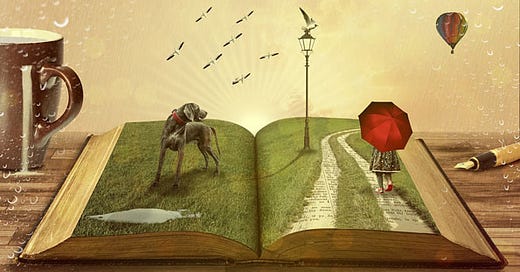Why Reading Fiction Matters
A letter to my son about how books can open your heart.
My 11-year-old son is at a reading crossroads. He’s been into fiction since infancy (at least, we’ve been reading fiction to him since infancy), and throughout most of his childhood he’s been able to lose himself in a good story. But lately he’s been avoiding books and expressing that he doesn’t particularly enjoy reading, except maybe the occasional Sports Illustrated Kids issue.
I don’t want to dictate what he reads, and I know he’s still reading plenty of fiction at school, but to me there’s a very real disadvantage to not seeking it out on your own. And it has nothing to do with book snobbery. I don’t think reading fiction is better than reading articles or watching TV; I certainly do plenty of both. But I do think fiction offers something that no other medium does, and it should be a part of everyone’s media diet.
Here’s what sets it apart: Fiction allows you to seamlessly get into the mind of another person — a fictional narrator’s. You’re “reading” their mind, so to speak, and they aren’t aware you’re doing that (even though the author is), so you’re getting an unfiltered view of their thoughts. By doing so, you gain a new perspective — which is, as I’m discovering in my older age, the best way to have a deeper, more meaningful understanding of those around you. This is particularly crucial in a time where we’re all pretty used to living in our own bubbles — and seem happy to stay there, as it’s becoming increasingly difficult to understand people outside our bubbles.
You simply can’t get the same experience from reading nonfiction or even watching a fictional story. In those experiences, you’re always an observer, taking in the story as a third party, as told to you by someone the way they want to tell it. Your own point of view is always a barrier to gaining full access to that person’s world. With fiction, you are actually seeing the world through the narrator’s eyes and internalizing their thoughts. Fiction, when written well, is the only medium with the potential for truly breaking down that barrier. Fiction brings you as close to the truth of another person as you can get. You’re not being told that person’s thoughts; you become that person.
Take, for example, Jean Hanff Korelitz’s The Latecomer. In this engrossing novel, the narration jumps from character to character, and sometimes you’re in the mind of a young man named Harrison who’s intensely disillusioned with his life and becomes an advocate of MAGA. I don’t converse with explicit MAGA supporters, nor do I seek out literature written by them. However, while reading the Harrison chapters, I slipped deep into the mind of one, to the point where I began to see his points. The author did such a good job of immersing me in Harrison’s insecurities and demons that I could easily understand why and how he’d feel the way he does and need to embrace certain ways of thinking. While I was reading his chapters, I thought like him. I understood him. I was him. MAGA made sense!
Similarly, in the charming novel Remarkably Bright Creatures by Shelby Van Pelt, one of the main characters is an older woman who’s about the same age as my own mother, whom I’m fairly close to. Yet, I think I gained more insight on the concerns of a septuagenarian from this book than from all the conversations I’ve had with my mom, who edits her thoughts for the sake of making pleasant conversation and never completely lets me into her mind. In Van Pelt’s story, I’m given an unfiltered look at what it’s like to be at a stage in life where many of your actions are governed by concerns over family, loss, and end of life. It was eye-opening.
Would Black Lives Matter be anything to argue over if everyone simply read Tayari Jones’ An American Marriage and walked in the shoes of Roy and Celestial for 308 pages? Could anyone not feel for migrants after experiencing the journey that a mother and son are forced to take in American Dirt by Jeanine Cummins? I was raised without religion, but after savoring Dearly Beloved, Cara Wall’s beautifully crafted book about two pastors and their partners, I felt I’d come as close to understanding a love for religion as I possibly could. It didn’t actually make me religious, but it made me better understand why so many people embrace it.
A good book will do that for you — expose you to ideas and frameworks that could be completely different from your own, and make you think, well, maybe those viewpoints don’t necessarily contradict mine. Maybe both can be true and valid at the same time. Maybe I’d think these other thoughts, too, if I lived in another set of circumstances.
I’m not saying that if everyone read fiction, there would be peace on earth. There’s still an onus on the reader to be open to the narrator’s story and really inhabit their world, rather than observing it from their own place in life. But fiction is the closest thing we have to making that happen. It may be the key to world peace — but readers still need to know how to use it.
I was trying to convey all this to my son last weekend, as I was coaxing him to go on a library run with me. At the time, I didn’t do the best job of explaining why it’s so important for him to continue to seek out other people’s stories. I didn’t have a fully formed idea and wasn’t able to properly articulate my thoughts. But now that I’ve had a chance to think about it, what I wanted to say to him was this:
I want you to better understand how other people view the world, so you judge less, empathize more. I want you to read books that will interest you, but that will also give you a glimpse of things you’ve never had to think about before. I want you to experience another person’s set of challenges, so you can understand the decisions they make and consider whether you’d make them yourself if things were different for you. Through books, we get to inhabit someone else’s body and walk in their shoes for at least a little while. It’s an amazing thing. Don’t ever stop reading.







I'm a high school English teacher so I know these conversations well! I totally agree with what you say here about opening up the world (and other worlds!) through fiction and being able to see through another person's eyes and experience the world as they do. Have you heard the phrase /concept "windows and mirrors"? We've found it helpful at work when discussing why stories are so vital. The "windows" are what you're describing here, seeing out of our own world and into someone else's world so we can better understand them; the "mirrors" are when we see people like ourselves reflected back to us and we can better understand ourselves. Both, I think, make us feel less alone. 📚 I've found graphic novels can be a great way to encourage reluctant readers back into fiction - there's so many amazing adaptations as well as originals and the artwork is often incredible. Audiobooks are great too - sometimes the kids who struggle a little to get immersed in a book find it useful to listen to the audiobook and read along with the paper copy. Ithink it helps them to keep their focus too just like when I read a novel aloud to the whole class. Thanks for sharing, I really enjoyed reading this today! 😊
Thank you -You convinced me on why I need to keep on encouraging my 14 year old to read fiction.
When I was concerned about my son re-reading the same few series over and over again and not being exposed to new fiction, a librarian once said to me, "It still is reading and he's getting something different every time."
There is some comfort in the predictability of re-reading and they may need that in their developing years to take comfort in that, when everything else around them, is so unpredictable. Likewise, "when schoolwork is in a tougher part of the year", the librarian commented, she notices "the students tend to pick lighter books to lighten the brain work a little."
Some food for thought as we continue to support our children.